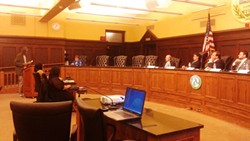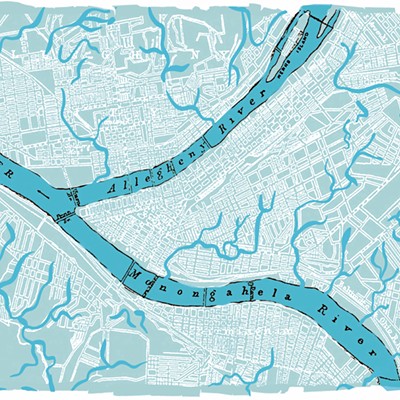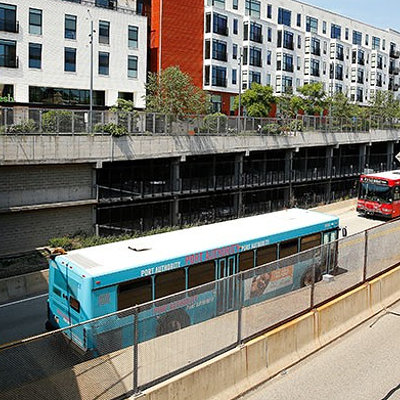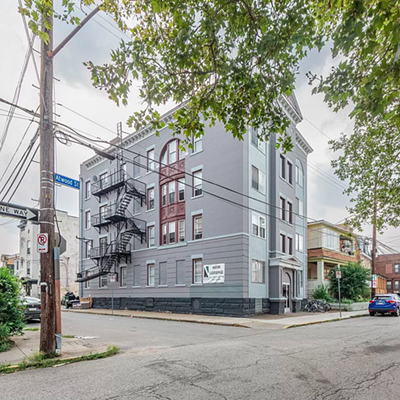Thursday, November 19, 2015
Social-service agencies, ratepayers ask Allegheny County for water and sewage rate assistance
Social-service agencies and ratepayers asked the Allegheny County Sanitary Authority (ALCOSAN) for an easily accessible and "effective" community-assistance program, as water and sewage rates have risen and will continue to do so over the next several years.
“One thing that motivates me is my ability to rise, wash my body and prepare for the new day. I must admit I’ve been in the position before where this holy ritual was not  possible," Wallace Hamilton, a rate-payer from Swissvale, testified at a hearing Monday evening in front of ALCOSAN board members. "Social Security did not provide any cost-of-living increase for next year, and there’s no guarantee for the years to come. This means the elderly, the disabled and everyone with low or fixed incomes must find money they don’t have just for the privilege of flushing their toilets."
possible," Wallace Hamilton, a rate-payer from Swissvale, testified at a hearing Monday evening in front of ALCOSAN board members. "Social Security did not provide any cost-of-living increase for next year, and there’s no guarantee for the years to come. This means the elderly, the disabled and everyone with low or fixed incomes must find money they don’t have just for the privilege of flushing their toilets."
The rate increases — 17 percent last year, and 11 percent this year and for 2016 and 2017 respectively — are to cover the cost of federally mandated fixes for aging sewer infrastructure. During rainstorms or when snow is melting, these lines, which carry sewage and stormwater, overflow into the area's waterways, a violation of the Clean Water Act. The fix is going to cost approximately $2 billion.
ALCOSAN formed a subcommittee in March to create a financial-assistance program. The committee members include John Weinstein, ALCOSAN board chair and Allegheny County treasurer; Greg Jones, executive director of Economic Development South, which works with the county's southern municipalities; Sylvia Wilson, of the Pittsburgh Public Schools Board; and Corey O'Connor, Pittsburgh City Council member representing District 5. The committee says it has also met with the advocacy group Clean Rivers Campaign, as well as billing agencies and companies that already administer assistance programs, such as People's Natural Gas.
More than 20 people testified and representatives from nearly 10 social services organizations attended the hearing in the County Courthouse. Requests and suggestions included an assistance program that avoided unnecessary paperwork and that modeled itself after, and possibly worked with, existing programs such as the heating-assistance program LIHEAP. Also, social-service counselors and rate-payers advocated for bill discounts and management of arrears, or late fees.
"A sewer bill is only one of many bills," said Patrick Cicero, executive director of the Pennsylvania Utility Law Project, a legal-aid organization for low-income residents. "At a minimum, households must pay taxes, rent, food, transportation, child care, health-care costs, electric, gas, trash, water and sewer. For households with fixed incomes or parents in low-wage jobs, there is often just not enough money to pay all of those bills each month."
Cicero suggested that ALCOSAN create a program that requires low-income residents to only devote 1.5 percent to 3 percent of their entire income, depending on how much they make, to water and sewage bills. Citing census data, Cicero said that 20 percent of households in ALCOSAN's service area make $20,000 or less per year; 31 percent make a total yearly household income of $30,000.
"The problem of unaffordable utility service is not isolated in certain pockets of the ALCOSAN service territory or limited to a small percentage of the territory. Rather, it is persistent and pervasive across all corners of ALCOSAN’s service territory," Cicero said in his testimony. "It is therefore critical to address through adoption of a comprehensive and far-reaching program."
During her testimony, Jennifer Jones, a board member of Action United, a group that advocates for Pennsylvania's low-income residents, told ALCOSAN's subcommittee: "Our incomes are not going up as fast as these bills. That means something's got to go."
By phone, Jones, of Hazelwood, told City Paper that her water and sewage bill has gone from about about $73 a month to $94 since the rate increases in 2014. "My usage has stayed about the same," she said.
"So the effect of that turns out to be that the bill gets kind of out of hand. Pay one bill or one gets shut off. Pay the bill and have no extra food in the house for the kids and no new school clothes, so something’s gotta give. And it’s just the beginning," Jones says.
Water authorities in Allegheny County municipalities charge for their services and on behalf of ALCOSAN. Then, municipalities pay ALCOSAN quarterly. ALCOSAN's pipes carry sewage and stormwater from 83 municipalities in the county to its waste-water treatment facility.
Bill Bartlett, director at Action United, says that ALCOSAN told his organization that the rate increases will continue beyond 2017 — to the tune of 10 percent annually for up to a decade.
"That is just the ALCOSAN charge [on the bill]. You’re talking about going from an insignificant bill to a significant bill," he said via phone.
ALCOSAN says that while more rate increases are likely, they are not set, and the authority is negotiating for lower rates. ALCOSAN spokesperson Jeanne Clark says that percentages can be misleading. According to the authority, an average household will see a monthly increase of $3.53 in the ALCOSAN portion of its bill in 2016.
Meanwhile, individual municipalities have been mandated to update their infrastructure. For instance, the Pittsburgh Water & Sewer Authority will invest $156 million in improvements.
The authority says that working with so many different municipalities will be a challenge in creating the community-assistance program but that it is dedicated to doing so.
"We are committed to this. I want to be crystal-clear. This is very important to the million people that we service every day. This is not easy by any stretch of the imagination. Don’t let anyone kid you," said Weinstein at the hearing. "Working with 83 individual municipalities is a challenge in itself. Very very difficult."
He also said his experience as county treasurer, and helping low-income seniors qualify for discount tax programs, helps him be "very aware of the importance of this program."
Greg Jones, of Economic Development South and chair of the subcommittee, told CP via email that he couldn't give an answer for a definite timeline for a roll-out of a financial-assistance program.
"The meeting [Monday] evening was part of our ongoing effort to get public input. Now our task is, take everything we’ve heard over the last year and formulate a program," he wrote. "That work will likely include negotiated agreements with regional water authorities and with a third party to provide administration of the overall program. So the timeline isn’t completely in our control. But, it’s my hope that we can get something in place within the first half of 2016."
A video of the hearing can be found on ALCOSAN's YouTube channel. Clark says that the transcript will be available in two weeks.
“One thing that motivates me is my ability to rise, wash my body and prepare for the new day. I must admit I’ve been in the position before where this holy ritual was not

Photo by Ashley Murray
Wallace Hamilton, of Swissvale, testified at an ALCOSAN hearing on Monday night at the County Courthouse.
The rate increases — 17 percent last year, and 11 percent this year and for 2016 and 2017 respectively — are to cover the cost of federally mandated fixes for aging sewer infrastructure. During rainstorms or when snow is melting, these lines, which carry sewage and stormwater, overflow into the area's waterways, a violation of the Clean Water Act. The fix is going to cost approximately $2 billion.
ALCOSAN formed a subcommittee in March to create a financial-assistance program. The committee members include John Weinstein, ALCOSAN board chair and Allegheny County treasurer; Greg Jones, executive director of Economic Development South, which works with the county's southern municipalities; Sylvia Wilson, of the Pittsburgh Public Schools Board; and Corey O'Connor, Pittsburgh City Council member representing District 5. The committee says it has also met with the advocacy group Clean Rivers Campaign, as well as billing agencies and companies that already administer assistance programs, such as People's Natural Gas.
More than 20 people testified and representatives from nearly 10 social services organizations attended the hearing in the County Courthouse. Requests and suggestions included an assistance program that avoided unnecessary paperwork and that modeled itself after, and possibly worked with, existing programs such as the heating-assistance program LIHEAP. Also, social-service counselors and rate-payers advocated for bill discounts and management of arrears, or late fees.
"A sewer bill is only one of many bills," said Patrick Cicero, executive director of the Pennsylvania Utility Law Project, a legal-aid organization for low-income residents. "At a minimum, households must pay taxes, rent, food, transportation, child care, health-care costs, electric, gas, trash, water and sewer. For households with fixed incomes or parents in low-wage jobs, there is often just not enough money to pay all of those bills each month."
Cicero suggested that ALCOSAN create a program that requires low-income residents to only devote 1.5 percent to 3 percent of their entire income, depending on how much they make, to water and sewage bills. Citing census data, Cicero said that 20 percent of households in ALCOSAN's service area make $20,000 or less per year; 31 percent make a total yearly household income of $30,000.
"The problem of unaffordable utility service is not isolated in certain pockets of the ALCOSAN service territory or limited to a small percentage of the territory. Rather, it is persistent and pervasive across all corners of ALCOSAN’s service territory," Cicero said in his testimony. "It is therefore critical to address through adoption of a comprehensive and far-reaching program."
During her testimony, Jennifer Jones, a board member of Action United, a group that advocates for Pennsylvania's low-income residents, told ALCOSAN's subcommittee: "Our incomes are not going up as fast as these bills. That means something's got to go."
By phone, Jones, of Hazelwood, told City Paper that her water and sewage bill has gone from about about $73 a month to $94 since the rate increases in 2014. "My usage has stayed about the same," she said.
"So the effect of that turns out to be that the bill gets kind of out of hand. Pay one bill or one gets shut off. Pay the bill and have no extra food in the house for the kids and no new school clothes, so something’s gotta give. And it’s just the beginning," Jones says.
Water authorities in Allegheny County municipalities charge for their services and on behalf of ALCOSAN. Then, municipalities pay ALCOSAN quarterly. ALCOSAN's pipes carry sewage and stormwater from 83 municipalities in the county to its waste-water treatment facility.
Bill Bartlett, director at Action United, says that ALCOSAN told his organization that the rate increases will continue beyond 2017 — to the tune of 10 percent annually for up to a decade.
"That is just the ALCOSAN charge [on the bill]. You’re talking about going from an insignificant bill to a significant bill," he said via phone.
ALCOSAN says that while more rate increases are likely, they are not set, and the authority is negotiating for lower rates. ALCOSAN spokesperson Jeanne Clark says that percentages can be misleading. According to the authority, an average household will see a monthly increase of $3.53 in the ALCOSAN portion of its bill in 2016.
Meanwhile, individual municipalities have been mandated to update their infrastructure. For instance, the Pittsburgh Water & Sewer Authority will invest $156 million in improvements.
The authority says that working with so many different municipalities will be a challenge in creating the community-assistance program but that it is dedicated to doing so.
"We are committed to this. I want to be crystal-clear. This is very important to the million people that we service every day. This is not easy by any stretch of the imagination. Don’t let anyone kid you," said Weinstein at the hearing. "Working with 83 individual municipalities is a challenge in itself. Very very difficult."
He also said his experience as county treasurer, and helping low-income seniors qualify for discount tax programs, helps him be "very aware of the importance of this program."
Greg Jones, of Economic Development South and chair of the subcommittee, told CP via email that he couldn't give an answer for a definite timeline for a roll-out of a financial-assistance program.
"The meeting [Monday] evening was part of our ongoing effort to get public input. Now our task is, take everything we’ve heard over the last year and formulate a program," he wrote. "That work will likely include negotiated agreements with regional water authorities and with a third party to provide administration of the overall program. So the timeline isn’t completely in our control. But, it’s my hope that we can get something in place within the first half of 2016."
A video of the hearing can be found on ALCOSAN's YouTube channel. Clark says that the transcript will be available in two weeks.
Tags: ALCOSAN , ratepayers , community assistance program , Image














